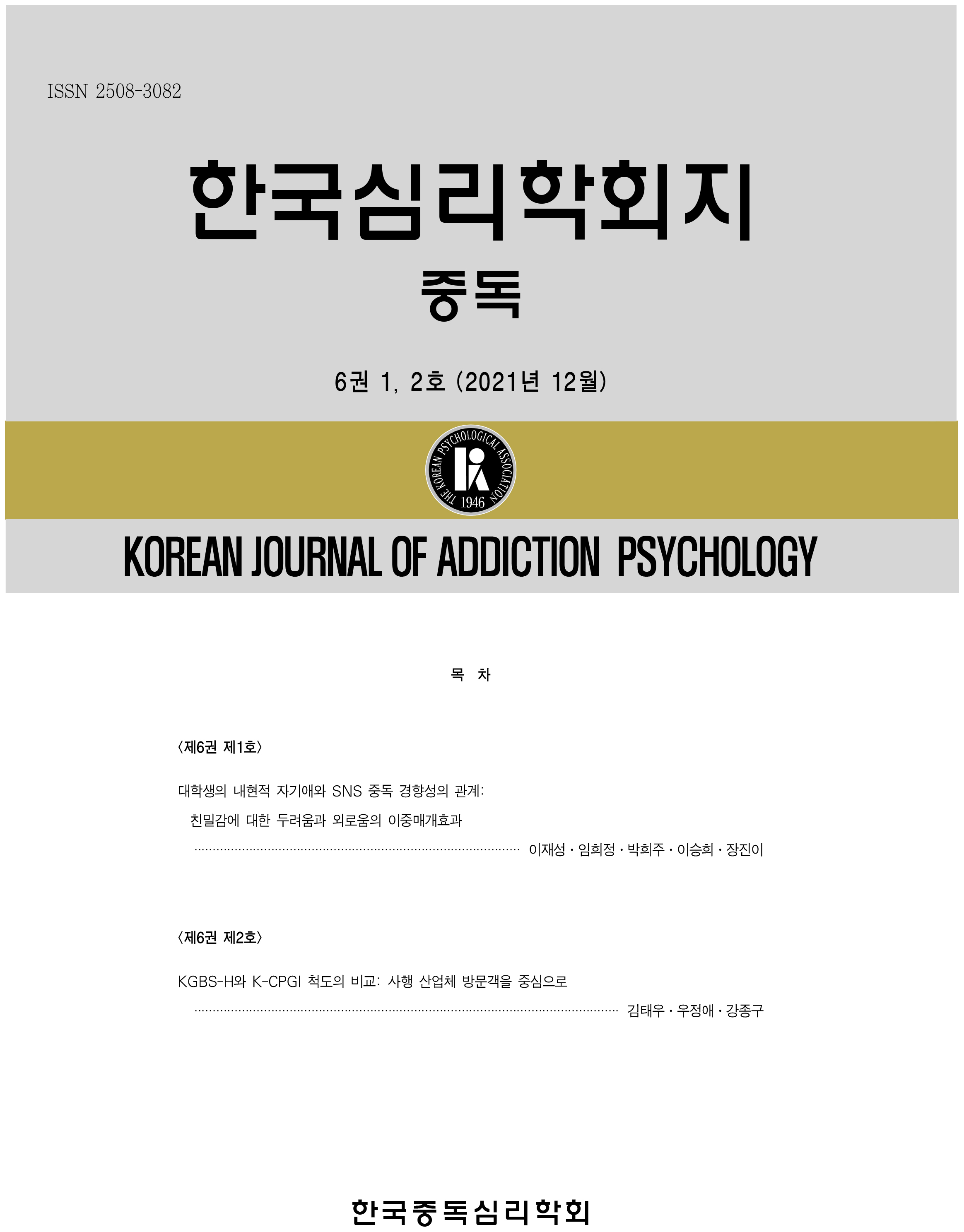3권 2호
초록
중독은 불행감과 관련된다. 점차 심각해지고 있는 청소년 중독을 예방하기 위해서는 청소년의 행복감 증진이 필요하다, 가정과 학교, 사회 등에서 청소년이 행복할 수 있어야 중독대상으로 도피하지 않게 된다, 무엇보다 가정에서부터 부모와의 관계형성이 잘 되어야 청소년이 자기를 사랑하게 되고 자존감이 높아지면서 행복감을 가지게 되어 중독대상으로부터 멀어질 수 있다. 청소년의 행복은 자존감, 회복탄력성, 관계형성, 마음챙김과 자비수행, 영성 등과 관련된다. 본 연구는 청소년의 중독 예방에 있어서 행복의 중요성을 제안하고. 청소년의 행복 증진과 관련되는 구체적인 요인들에 대해서 살펴보았다는 점에서 함의를 지닌다.
Abstract
Addiction is associated with unhappiness. In order to prevent serious adolescent addiction, it is necessary to improve the happiness of the adolescent. At home, school, society, etc., the adolescent must be happy so that they do not escape to the addictive subjects. First of all, the relationship with parents should be harmonious. As adolescent love themselves, and their self-esteem increases, they become happier and can get away from the addicted subject. Adolescents happiness is related to the self-esteem, resilience, relationship formation, mindfulness, compassion training and spirituality. This study has implications for the prevention of addiction of adolescents by mentioning the necessity of adolescent happiness and examining specific factors related to the promotion of adolescent happiness.
초록
본 연구는 보호관찰청소년의 도박실태를 파악하고 도박중독에 영향을 미치는 심리사회적 변인 중 또래 스트레스와 외로움을 중심으로 도박문제와의 관계를 탐색해 보고자 하였다. 이를 위해 전국 18개 보호관찰소의 청소년 274명을 대상으로 조사를 진행하였다. 주로 활용한 통계분석방법은 차이검증, 상관 및 회귀분석이다. 본 연구의 결과 보호관찰청소년 중 65%가 도박을 경험해 본 것으로 나타났으며 청소년에게 금지되어 있는 사행행위 중 경주권 구입은 1.8%, 온/오프라인 복권 구입은 21.9%의 비율로 경험하는 것으로 나타났다. 특히 카지노 등의 온라인 불법도박을 경험하는 비율은 14.6%로 비교적 높게 나타났다. 도박중독수준을 분석한 결과 17%의 보호관찰청소년이 위험 및 문제수준 도박자에 해당하는 것으로 나타났다. 또한 또래관계 스트레스가 도박중독에 미치는 관계에서 외로움의 매개효과를 분석한 결과 외로움이 또래관계 스트레스와 도박중독의 관계를 유의하게 부분매개 하는 것으로 나타났다. 즉, 또래관계 스트레스를 경험할수록 외로움을 느끼며 이는 도박중독을 증가시키는 것으로 나타났다.
Abstract
This study aimed to understand the actual gambling status of adolescents on probation, and also to explore the relation with gambling problem focusing on the peer stress and loneliness out of the psychosocial variables having effects on the gambling addiction. For this, a survey was conducted targeting total 274 adolescents in 18 probation offices in the whole nation, and total 274 questionnaires were used for the analysis. The statistical analysis methods mainly used were the difference verification, correlation analysis, and regression analysis. In the results of this study, the 65% of adolescents on probation experienced gambling, including the speculative acts prohibited on adolescents such as the purchase of race ticket(1.8%), and the purchase of on/offline lottery ticket(21.9%). Especially, the rate of experiencing the online illegal gambling like casino was relatively high(14.6%). In the results of analyzing the gambling addiction level, the 17% of adolescents on probation were the dangerous or problematic gamblers. Also, in the results of analyzing the mediating effects of loneliness on the effects of peer stress on the gambling addiction, the loneliness significantly partially-mediated the relationship between peer stress and gambling addiction. In other words, when experiencing the peer stress, they felt lonely, which was led to the increase of gambling addiction.
초록
본 연구의 목적은 청소년 도박문제를 예측하는 비합리적 신념의 구체적인 목록을 탐색하고, 우울 및 불안정서가 비합리적 신념의 효과를 촉진하는지 살펴보는 것이다. 이를 위해, 온라인조사업체에 등록되어 있는 13~18세 청소년 중 다섯 종류의 불법도박을 한번 이상 해본 경험이 있는 659명을 대상으로 자료를 수집했다. 연구에 활용한 비합리적 도박신념 목록은 김예나 등(2018)이 수행한 청소년 도박문제 발달 과정에 대한 질적연구 원자료와 기존에 성인들을 위해 개발한 도박 관련 신념 척도를 참고하여 개발했다. 분석 결과 단일요인으로 구성된 일곱 개의 구체적인 비합리적 도박신념 목록이 확인되었고, 각각의 신념은 성별이나 연령, 학업수준과 관계없이 불법도박행동빈도와 도박문제수준을 높이는 것으로 나타났다. 더하여 청소년의 비합리적 도박신념과 도박문제 사이의 관계를 우울 및 불안정서가 촉진하는지 살펴보기 위해 조절효과를 검증한 결과, 우울 및 불안 수준이 높을수록 비합리적 도박신념이 도박문제수준을 증가시키는 효과가 더 큰 것으로 나타났다. 마지막으로 본 연구결과를 청소년 도박 예방과 상담의 관점에서 논의했다.
Abstract
The purpose of this study is to explore a specific list of irrational beliefs that predict adolescence gambling problems. In addition, we tried to examine whether depression and anxiety promote the effects of irrational beliefs. To that end, we collected data from 659 adolescents(13-18 ages) registered On-line research company who answered that they had experienced five types of illegal gambling more than once. The list of irrational gambling beliefs used in this study was developed by referring to the qualitative research data on the development process of the youth gambling problem conducted by Kim et al.(2018) and by referring to the Irrational gambling beliefs developed for adults. The analysis identified seven irrational gambling beliefs items consisting of a single-factor structure. Each irrational gambling belief increased the frequency of illegal gambling behavior and gambling problem regardless of gender, age, and academic level. As a result of examining the moderating effects of depression and anxiety in the relationship between irrational gambling beliefs and gambling problems, it was found that the higher the level of depression or anxiety, the greater the effect that irrational gambling beliefs increase the gambling problem level appear. Finally, the results of this study were discussed in terms of youth gambling prevention and counseling.

